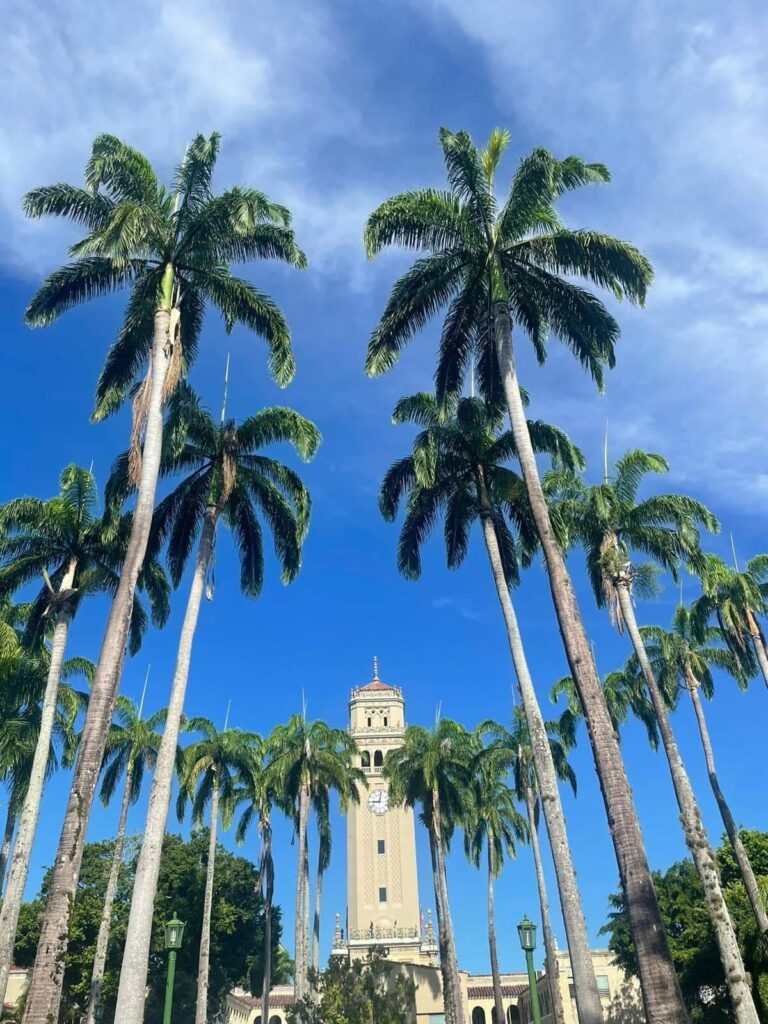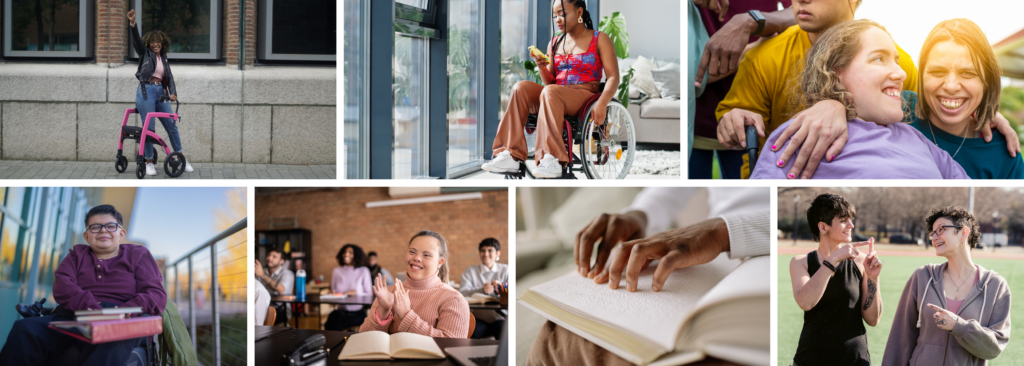Conversatorios Comunitarios en Recintos de la Universidad de Puerto Rico

En colaboración con los recintos de la Universidad de Puerto Rico en Aguadilla, Río Piedras y Cayey, nuestro equipo se lanzó al corazón de Borinquen. NDC fue invitado por personal de la Universidad de Puerto Rico que identificó una necesidad y quería hacer más por su estudiantado. Lo que comenzó como una misión para colaborar con personal universitario, estudiantes y miembros de la comunidad en la mejora de la accesibilidad y los resultados para personas sordas en la educación postsecundaria, rápidamente se transformó en algo mucho más profundo. Algunas de estas interacciones resultaron en intercambios de historias, perspectivas y un compromiso compartido para elevar a las personas sordas que revelaron un espíritu comunitario firme, arraigado en la resiliencia y el espíritu Boricua.
Community Conversations at University of Puerto Rico Campuses

In partnership with the University of Puerto Rico campuses in Aguadilla, Río Piedras, and Cayey, our team traveled to the heart of Borinquen. The university campus staff invited NDC because they saw a need and wanted to do better for their students. What began as a mission to collaborate with campus staff, students, and community members on improving accessibility and outcomes for deaf people in postsecondary education quickly unfolded into something far richer. Exchanges of stories, insights, and shared commitment to uplifting deaf people revealed the unwavering community spirit rooted in resilience and the Boricua spirit.
Deaf Student Research That Deserves the Spotlight at AERA 2025

Deaf students are often overlooked in research conversations, but this year’s AERA Annual Meeting in Denver offers something different. Researchers from the National Deaf Center (NDC) are shining a spotlight on the gaps, challenges, and missed opportunities in postsecondary settings for deaf students. Join us April 23–27 at the Colorado Convention Center!
Enhance Your Deaf Awareness & Register for NDC’s Micro-Certificate Today!

Imagine entering a classroom, a career services office, or a training session—only to find that no one is prepared to communicate with you. This is the reality for many deaf students across the country. Gaps in cultural awareness, outdated policies, and a lack of training for staff create real barriers to access. But here’s the good news: change is possible, and it starts with learning. The National Deaf Center (NDC) is excited to introduce a new learning opportunity: the Deaf Awareness Micro Certificate! Whether you work in disability services, education, postsecondary training, or simply want to deepen your knowledge of deaf communities, this self-paced program is ready for you.
Are Deaf Students with Multiple Disabilities Getting the Support They Need on Your Campus?

Think of a garden. Each plant has different needs—some require more sunlight, others need shade; some need deep soil, others thrive in shallow ground. But with the right environment, every plant can grow and flourish. Similarly, deaf students with multiple disabilities—sometimes identifying as deafblind, deafdisabled, deafplus, or deaf+—need specific tools and accommodations to thrive academically and socially. Colleges that prioritize accessibility, resources, and support create an environment where all students can succeed, just like a well-tended garden.
Employment and Education in the Rural Deaf Landscape

Rural areas boast beautiful open spaces and close-knit communities, but they also come with big challenges, especially for deaf people. A new report from NDC—“Rural Deaf Experiences: Employment and Educational Attainment Data”—shows that deaf people in rural areas face more obstacles than those in cities. They have fewer available job and school opportunities, and they often don’t have access to important services like interpreters or reliable internet connections, which are key for both communication and learning. This report is based on data from the 2018–2022 American Community Survey. NDC studied information from 12,181 deaf people, ages 16 to 24, who shared their experiences with education and employment.
Catch NDC’s Chase Burton Bringing Deaf Stories to Life at SXSW EDU

If you’re heading to SXSW EDU in a few weeks, get ready for an exciting session that brings the lived experiences of deaf people into the spotlight! On Tuesday, March 4th, from 4:30–5:00 PM CT, Chase Burton, Media Producer at the National Deaf Center (NDC), will take the stage at the Austin Convention Center (Room 13AB) to share the power of storytelling in advocacy through filmmaking.
Are Your Campus Emergency Plans Ready for Deaf Students?

Emergencies can happen anytime, anywhere—and campuses across the country are seeing more and more crises. From gun violence and severe weather to health emergencies like COVID-19, these situations are becoming more common and often more dangerous. But here’s the problem: emergency plans often don’t include the needs of deaf students, leaving them at risk.
Celebrating Deaf Entrepreneurs During National Disability Employment Awareness Month

October is National Disability Employment Awareness Month (NDEAM)—the perfect time to celebrate the incredible contributions people with disabilities make to the workforce. This year’s theme, “Access is Good Jobs for All,” really hits home. It’s all about making sure that everyone, including deaf people, has access to the jobs they deserve. For many deaf individuals, one of the most empowering paths is entrepreneurship. Why? Because it gives them the freedom to take control of their careers and create the kind of work environments they need to succeed.
Introducing the New Deaf Awareness Micro Certificate

National Deaf Center (NDC) is launching a new learning opportunity: the Deaf Awareness Micro Certificate! This self-paced program is designed for everyone— disability services professionals in higher ed, postsecondary training professionals, ASL students, educators, and service providers. This certificate provides foundational knowledge to help professionals improve educational and training program experiences for deaf students.
Foster Belonging for Deaf Students on Your Campus

Creating a welcoming and supportive campus for all students is crucial, especially for deaf students. Deaf students face unique challenges when transitioning to college, and these challenges can sometimes make it hard for them to stay engaged and succeed. To help these students feel like they belong, and encourage them to stay in school, institutions should make a campus-wide commitment to improving the campus experience for deaf students.
Are You Ready to Navigate Graduate School as a Deaf Student?

Are you thinking about graduate school? Or maybe you’re about to start? If so, you’re not alone! More deaf students are enrolling in graduate programs each year, including healthcare programs and majors. Getting a master’s degree or higher can help you earn more money and open up more career opportunities. On average, deaf individuals with a master’s degree or higher earn $15,000 more per year than those with just a bachelor’s degree (Bloom, Palmer, Winninghoff, 2024).





